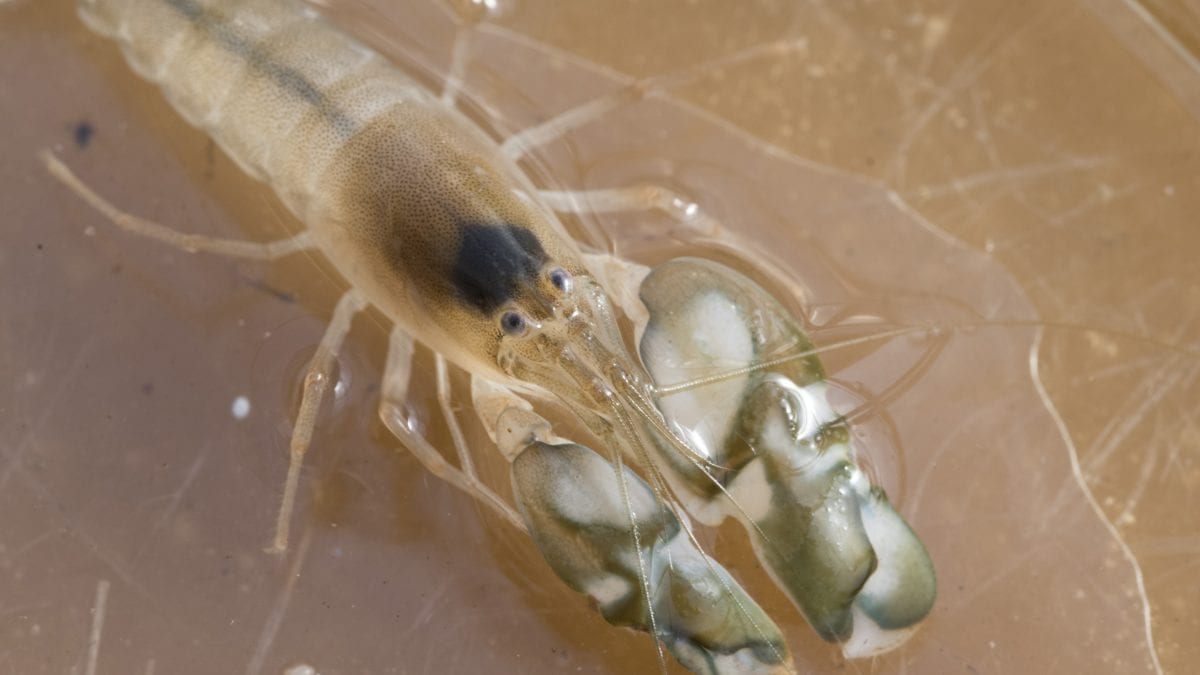 Snapping shrimp, which create a pervasive background crackling noise that sounds like bacon frying, are among the loudest of marine animals. Researchers have found that water temperature can profoundly affect their sound production. (Photo by Tom Kleindinst, © Woods Hole Oceanographic Institution)
Snapping shrimp, which create a pervasive background crackling noise that sounds like bacon frying, are among the loudest of marine animals. Researchers have found that water temperature can profoundly affect their sound production. (Photo by Tom Kleindinst, © Woods Hole Oceanographic Institution) February 18, 2020
One of the ocean’s loudest creatures is smaller than you'd expect—and will get even louder and more troublesome to humans and sea life as the ocean warms, according to new research presented at the Ocean Sciences Meeting in San Diego, Calif.
Snapping shrimp create a pervasive background crackling noise in the marine environment. Scientists suspect the sound helps the shrimp communicate, defend territories and hunt for food. When enough shrimp snap at once, the noise can dominate the soundscape of coastal oceans, sometimes confusing sonar instruments.
Researchers will present new results on Friday at the Ocean Sciences Meeting 2020 suggesting that with increased ocean temperatures, snapping shrimp will snap more often and louder than before. This could amplify the background noise, or soundscape, of the global ocean, with implications for marine life and humans.
“It's a really cool little animal,” said Aran Mooney, a marine biologist at Woods Hole Oceanographic Institution who will present the work. “They're a crustacean, kind of like a little shrimp or lobster. They make a sound by closing a claw so fast it makes this bubble and when that bubble implodes, it makes that snapping sound.”
Mooney and his colleague Ashlee Lillis detected a strong relationship between warmer waters and louder, more frequent snapping shrimp sounds by experimenting with shrimp in tanks in their lab and by listening to shrimp in the ocean at different water temperatures.
“As you increase that temperature, snap rates increase,” Mooney said.
This makes sense because shrimp are essentially cold-blooded animals, meaning their body temperature and activity levels are largely controlled by their environment, in the same way ants can move faster in warmer weather than in cool weather.
“We can actually show in the field that not only does snap rate increase, but the sound levels increase as well,” Mooney said. “So the seas are actually getting louder as water temperatures increase.”
Louder snapping shrimp could potentially have harmful effects on fish and even sonar used by submarines and ships.
“We know that fish use sound to communicate," Mooney said. "Fish call each other, and they make sounds to attract mates and for territorial defense. If the seas get louder, it has the potential to influence those communications. We don't really know that yet. That's something we have to follow up on.”
Human use of sound in the oceans might also be impaired by very loud snapping shrimp. Common instruments like sonar fish finders might be affected, Mooney said. There is also the possibility louder seas could affect instruments the Navy uses to detect mines, which could have implications for national defense, he said.
This research was supported by the National Science Foundation and the U.S. Navy.
###
More than 5,000 scientists are expected to present the latest research findings about the world’s oceans at the Ocean Sciences Meeting 2020. The biennial meeting brings together researchers from the American Geophysical Union, the Association for the Sciences of Limnology and Oceanography, and The Oceanography Society.
Woods Hole Oceanographic Institution is a private, non-profit organization on Cape Cod, Mass., dedicated to marine research, engineering, and higher education. Established in 1930 on a recommendation from the National Academy of Sciences, its primary mission is to understand the oceans and their interaction with the Earth as a whole, and to communicate a basic understanding of the oceans’ role in the changing global environment. For more information, please visit www.whoi.edu.
Key Takeaways:
- Snapping shrimp create a pervasive background crackling noise in the marine environment.
- Scientists think the sound helps the shrimp communicate, defend territories and hunt for food.
- With warming ocean temperatures, snapping shrimp will snap more often and louder than before.
- Louder snapping shrimp could potentially have harmful effects on fish and even sonar used by submarines and ships.





修改评论